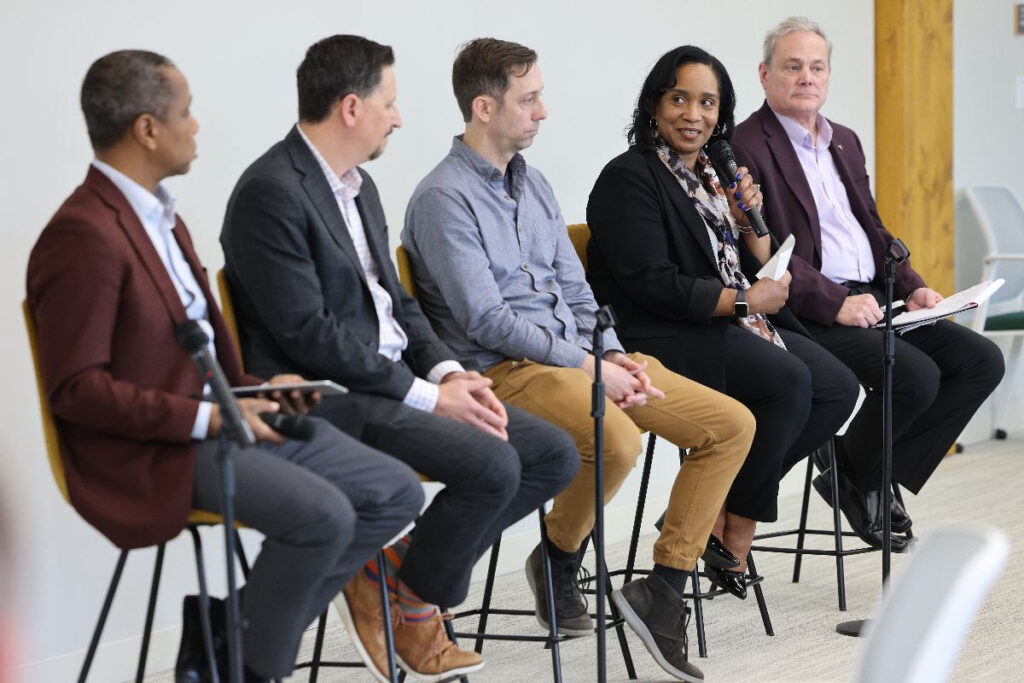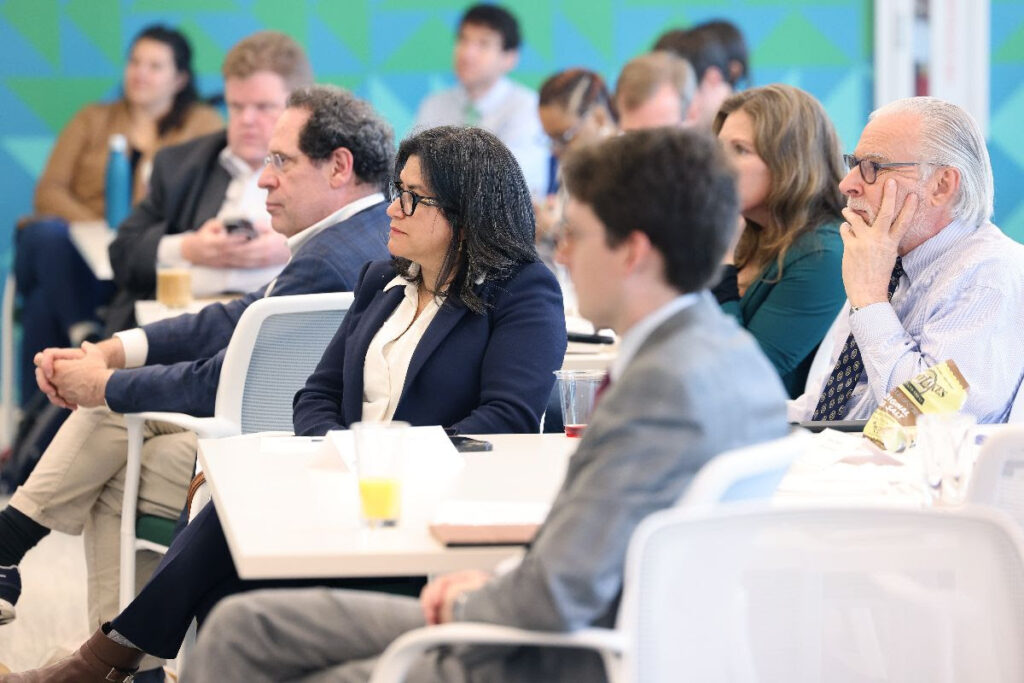Greetings from Cleveland

- Resources
Greetings from the National Housing Crisis Task Force!
On Monday, May 5, the Task Force held its second meeting of 2025 in Cleveland hosted by Co-Chair, Mayor Justin M. Bibb. During the meeting, the Task Force charted the course for its second-year goals and objectives and were inspired by Mayor Bibb, who spoke about the sustainable and innovative housing strategies Cleveland is employing in a fireside chat with Task Force member and former U.S. HUD Secretary Henry Cisneros.
The Task Force meeting was held at the Cleveland Foundation, the country’s first community foundation and a funder of the Task Force. The Foundation funds innovative ideas and pilot programs to serve its community in new ways.
Stabilizing Cleveland’s housing stock was at the center of the fireside chat, and Mayor Bibb detailed Cleveland’s new housing agenda, which includes innovations such as pairing tax abatements with modular housing and developing public-private partnerships to spur housing production. The Mayor highlighted the Cleveland Housing Investment Fund (CHIF), an innovative and catalytic public-private partnership between the City of Cleveland, Cleveland LISC, and Key Bank. CHIF’s goal is to create between 2,500 and 3,000 affordable housing units over the next 10 years. Mayor Bibb also highlighted Cleveland’s Site Readiness Fund for Good Jobs initiative, a $50 million program that is taking 1,000 acres of brownfield vacant land and turning it into shovel ready job sites for manufacturing companies, including manufacturers of modular housing that can be deployed on currently vacant lots. The initiative aims to create 5,000 new units over the next 10 years.
The fireside chat concluded with Secretary Cisneros asking Mayor Bibb why he co-chaired the Task Force. The Mayor’s answer? “Because America needs unity again, and housing is the issue that can unify the country. This Task Force has the ability to solve the affordable housing crisis.”
Mayor Bibb’s fireside chat was covered by multiple local media outlets, including by 19 News, which posted the entirety of the conversation. Watch it here.
Sustainability and Innovation in Housing Production and Preservation
On Tuesday, May 6, the Task Force hosted a regional workshop that brought together housing leaders from multiple cities in Ohio and around the region with similar housing challenges to Cleveland to discuss new financing models, construction innovation, housing preservation, and neighborhood revitalization.

During the first workshop panel, “Leveraging and Scaling Modular Infill Development,” attendees talked about the potential opportunity offered by modular and panelized construction methods as a solution for infill development. Modular can enable speed and efficiency in housing production and create jobs by getting residents involved in home construction. Modular manufacturing facilities were highlighted as holistic approaches to building energy efficient and modern housing of various types, including single-family homes, townhomes, small apartments, and large apartment buildings. The top challenges to uptake and scale these new housing technologies include a lack of familiarity from permitting departments and construction firms, the need for sufficient local demand to drive down costs and develop contractor familiarity with modular construction methods, and high collateral and underwriting costs.
The second workshop panel, “Whole Home Repair and Renovation,” focused on community-focused home repair and renovation programs as a potential solution for stabilizing and revitalizing neighborhoods while increasing the resiliency of existing housing. Panelists from Rising Tide Partners, a Pittsburgh nonprofit that works with community partners to proactively acquire real estate to preserve affordable housing, and ReBuild Metro, a Baltimore-based organization that rebuilds blighted houses to restore whole blocks, emphasized the importance of community-led revitalization efforts. They highlighted that these programs can prevent displacement, address blight, and stabilize the markets in the home repair and renovation process at scale in those cities.
Panelist Alyssa Hernandez, Director of the Cleveland Department of Community Development, also highlighted the challenge to scale in Cleveland, pointing out that overly complicated federal programs to get homes updated and safe for residents often conflict with the scale and capacity of small-scale contractors. She highlighted the challenges with contractors and developers encountering issues or “kill points” at each step of repair and/or construction, and the city’s efforts to reduce barriers for residents and service providers.

The need for scale and imagination in rethinking how our current housing systems work – and the desire to do so at a fast pace to attack the housing crisis – were persistent themes throughout the day and will continue to inform the Task Force’s work over the next year.
Next Steps
The Task Force plans to release the second tranche of tools from the State and Local Housing Action Plan the week of May 19, including tools that highlight philanthropy’s role in supporting housing production and using public asset corporations to turn publicly owned land into public assets. The Task Force plans to release the full Action Plan later this summer. The Task Force is also working on Governors’ “10 Point Plans” – strategies that state leaders can implement to address the housing crisis. The Task Force’s work will be featured at the May National Community Stabilization Trust Community Impact Briefing on May 21, and at the Bipartisan Policy Center’s 2025 Terwilliger Center Summit on Housing Supply Solutions on June 18.

